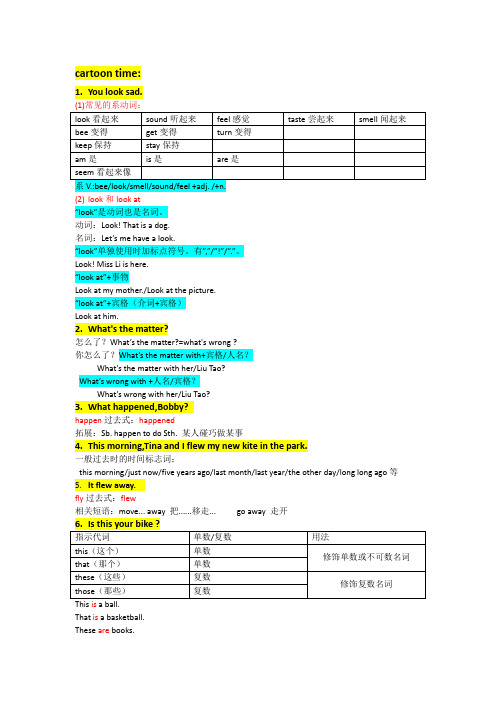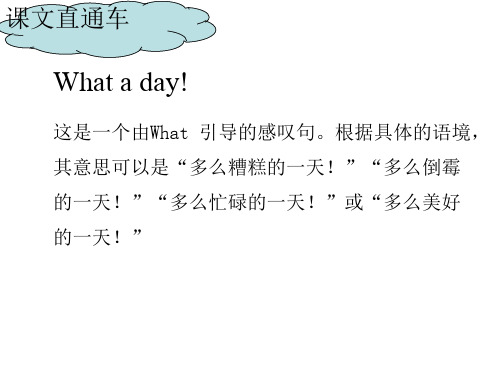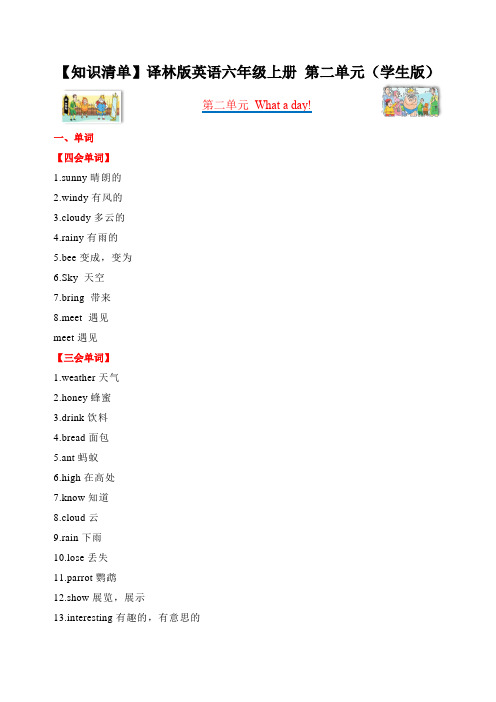Unit2What a day! 单元知识整理
Unit2Whataday!_Cartoontime知识点讲解译林版英语六年级上册(1)

cartoon time:1.You look sad.(2)look和look at“look”是动词也是名词。
动词:Look! That is a dog.名词:Let’s me have a look.“look”单独使用时加标点符号。
有”,”/”!”/”.”。
Look! Miss Li is here.“look at”+事物Look at my mother./Look at the picture.“look at”+宾格(介词+宾格)Look at him.2.What's the matter?怎么了?What’s the matter?=what's wrong ?你怎么了?What’s the matter with+宾格/人名?What’s the matter with her/Liu Tao?What’s wrong with +人名/宾格?What’s wrong with her/Liu Tao?3.What happened,Bobby?happen过去式:happened拓展:Sb. happen to do Sth. 某人碰巧做某事4.This morning,Tina and I flew my new kite in the park.一般过去时的时间标志词:this morning/just now/five years ago/last month/last year/the other day/long long ago等5.It flew away.fly过去式:flew相关短语:move... away 把......移走...go away 走开This is a ball.That is a basketball.These are books.Those are flowers.注意:that’s= that is 但是this is 不可以缩写。
Unit 2 知识梳理+考点精练-六年级英语上册(译林版三起)

2.After some rainy days,itfinally.
3.Yang Lingfor breakfast yesterday.
4.The children usually go to school by bus,but theylast week.
三、1.is snowing2. were 3. brought 4. rains,rained, rainy 5. became, cloudy 6. Was
四、单项选择。
()1.it oftenin winter here?
A.Is;rainB.Does;rainsC.Does;rain
()2.I don't like theweather.I like sunshine.
A.cloudB.cloudyC.sunny
()3.Let the rainbecause we want to play outside.
4.become意为“变成,变为”,体现转变。
例如:Itbecomescoldinwinter.冬天天气变冷了。
5.bring和take:
bring意为“带来”,指从别的地方带到说话人或提到的人这边。例如:
Myfatherbroughtmeabag.=Myfatherbroughtabagtome.我爸爸给我带来了一个包。
2.Wesawmanyinterestingparrots.我们看到了很多有趣的鹦鹉。
3.Weflewkiteshighinthesky.我们在高空中放风筝。
4.Ibroughtsomebread.我带来了一些面包。
六上 Unit 2 What a day!知识点

六上Unit 2 What a day!一、语音ear / / d ear h ear n ear y ear/ / w ear p ear b ear/ / ear ly l ear n h ear d二、词汇weather 天气1. 询问天气:How is the weather today? = What is the weather like today?回答: It’s cloudy/ windy/rainy/snowy/ sunny/foggy.询问天气:How was the weather yesterday? = What was the weather like yesterday?回答: It was cloudy/ windy/rainy/snowy/ sunny/foggy.2. 注意词形变化:表示天气的形容词,一般情况下在名词后加ycloud---cloud y wind---wind y rain---rain y snow---snow ysun ---sun ny fog---fog gy3.比较:It was cloudy yesterday. There were a lot of clouds in the sky yesterday.It was rainy yesterday. There was a lot of rain yesterday. It rain ed yesterday.It was snowy yesterday. There was a lot of snow yesterday. It snow ed yesterday.4. 复习:warm, hot, cool, cold三、词组1.What a day! 多么糟糕的(……)一天啊!2. a parrot show 一场鹦鹉表演3.the twentieth of September 9月20日September,the twentieth 4.go to the park by bikeride a bike to the park 骑自行车去公园5.fly kites high 放风筝放得高6.some interesting parrots 一些有趣的鹦鹉7.in the sky 在天空中8.become windy and cloudy 变得多云而有风9.some dumplings 一些饺子10.bring lunch to the park 带午餐来公园11.some drinks 一些饮料12.eat our lunch 吃我们的午饭13.some bread 一些面包14.all day 整天15.some honey 一些蜂蜜16.well done 干得好17.go away 走开18.another day 改日19.meet Bobby in the park在公园遇见波比20.look sad 看起来很难过21.lose my new kite 丢失我的新风筝22.What happened? 出什么事了?23.this morning 今天上午24.climb up the hill 爬上山25.fly too high 飞得太高26.hold onto 抓紧27.fly away 飞走28.find it near the hill 在小山旁发现它29.watch/see a film 看一场电影st Sunday 上个星期天31.have a picnic 举行一次野餐32.write a diary 写一篇日记33.go for a picnic 去野餐34.like writing diaries 喜欢写日记35.go for a walk / take a walk 去散步36.do housework 做家务活四、语法知识:1. 表示一般过去时的句式有两种:1)肯定句:主语+be动词过去式(was, were)+其他否定句:主语+be动词过去式(was, were)+not+其他一般疑问句:Be动词过去式(was, were) +主语+其他?如:I was tired yesterday. I was not tired yesterday. I wasn’t tired yesterday.Were you tired yesterday? Yes, I was. No, I wasn’t.We were in the park last weekend. We were not in the park last weekend.Were you in the park last weekend?Yes, we were. No, we weren’t.注意:单数was, 复数were, 不可数名词作主语,看成单数用was。
6A Unit2 What a day!教师版

6-A Unit 2 What a day! 一.单词:sunny ['sʌnɪ] 晴朗的show [ʃəʊ] 展览,展示interesting ['ɪntrɪstɪŋ]有趣的,有意思的weather ['weðə] 天气become [bɪ'kʌm] 变成,变为windy ['wɪndɪ] 有风的cloudy ['klaʊdɪ] 多云的high [haɪ] 在高处sky [skaɪ] 天空bring [brɪŋ]带来honey ['hʌnɪ] 蜂蜜drink [drɪŋk] 饮料ant [ænt] 蚂蚁bee [biː]蜜蜂cloud [klaʊd] 云rain [reɪn] 下雨rainy [ˈreɪni] 多雨的meet [miːt]遇见Lose [luːz]丢失know [nəʊ] 知道What happened? [wɒt 'hæpəned] 出什么事了?climb up [klaɪmʌp] 爬上hold onto [həʊld 'ɒntuː] 抓紧fly away [flaɪə'weɪ] 飞走二.短语:1 the twentieth of September 9月20日2 a parrot show一场鹦鹉表演3 some interesting parrots一些有趣的鹦鹉4 become windy and cloudy变得多云而有风5 fly kites high放风筝放得高6 in the sky在天空中7 bring some dumplings带来一些饺子8 some honey一些蜂蜜9 some drinks一些饮料10 eat our lunch吃我们的午饭11black clouds乌云12 What a day! 多么糟糕的一天啊!13 all day整天14 well done干得好15 go away走开16 another day改日17 meet Bobby遇见波比18look sad看起来很难过19 lose my new kite丢失我的新风筝20want to know why想要知道为什么21 What happened? 出什么事了?22this morning/ afternoon/ evening 今天早晨/ 下午/ 晚上23in the morning/ afternoon/ evening在早晨/ 下午/ 晚上24 climb up爬上25 fly too high飞得太高26 hold onto抓紧27 fly away飞走28 last Sunday上个星期天29 watch a film看一场电影30 have a picnic举行一次野餐31find it 找到它32. near the hill 在小山附近33in your diary 在你的日记里34cheer together一起欢呼三.重要句型1.It was sunny in the morning. 早上天气晴朗。
牛津译林版小学英语六年级上册《unit2whataday》知识点详解知识讲解教案

牛津译林版小学英语六年级上册《unit2whataday》知识点详解知识讲解教案1. Unit2 What a day本单元主要内容是介绍时间、描述一天的活动,以及介绍一些早上和晚上常见的活动。
通过本单元的学习,学生将掌握日常生活的一些基本表达方式。
2. 词汇本单元涉及的一些常见词汇如下: - get up 睡醒,起床 - have breakfast 吃早餐 - have lunch 吃午餐 - have dinner 吃晚餐 - go to bed 上床睡觉 - brush teeth 刷牙- wash face 洗脸 - watch TV 看电视 - do homework 做功课3. 语法本单元的语法主要是询问时间和介绍一天中的活动。
常用的句型有: - What time is it? 现在几点钟? - It’s seven o’clock. 现在是七点钟。
- What do you do in the morning/afternoon/evening? 你早上/下午/晚上做什么? - I get up at six. 我六点钟起床。
- I have breakfast at seven. 我七点钟吃早餐。
4. 句型练习下面是几个句型的练习,可以帮助学生更好地掌握本单元的语言点。
1.What time is it? It’s ____________.2.What time do you get up in the morning? I getup at ____________.3.What do you do in the evening? I ____________.4.What time do you have lunch? I have lunch at____________.5.What do you do before going to bed? I____________.5. 文化知识本单元还涉及到一些文化知识,例如西方国家的饮食文化和作息习惯。
Unit2-What-a-day知识点详解知识讲解

bring和take的区别 bring :把某物带来某地 bring …to… (从远处带到近处) take :把某物带去某地 take… to …( 从近处带到远处)
bread是不可数名词,我们常说a piece of bread (一片面包)或some bread。
日期的表示方法:1)the + 日子(序数词)+ of + 月份 2)月份+ the + 日子(序数词)
在7月5日: on the fifth of July/ July the fifth 在3月18日:on the eighteenth of March
March the eighteenth (在具体日期前,用“on”)
/eə/ bear pear wear
卡通直通车
Sam meets Bobby in the park. meet sb.遇到某人,见到某人
meet动词,后面人称代词用宾格, 如:meet me/you/him/her/them met(meet的过去式)
You look sad.
• look sad看起来很难过 • (look看起来,为系动词,后跟形容词)
课文直通车
What a day!
这是一个由What 引导的感叹句。根据具体的语境, 其意思可以是“多么糟糕的一天!”“多么倒霉 的一天!”“多么忙碌的一天!”或“多么美好 的一天!”
• 20th September (读法: the twentieth of September ) September 20th ( 读法:September the twentieth )
It’s time for bed.= It’s time to go to bed. It’s time for some drinks. = It’s time to have some drinks.
六年级上册Unit2-What-a-day!单元分析

六年级上册Unit2 What a day!单元分析一、教学内容Unit 2What a day二、教学目标1.知识目标A. 能听懂、会说、会读show,interesting,weather,high,honey,ant,bee,cloud,rain, lose,know,climb up,hold onto,fly awayB. 能听懂、会说、会读、会写词汇:sunny, become, windy, cloudy, drink, rainy, meet, sky>句型:It was sunny/cloudy/windy. I /We/He/She brought/saw/flew…What happened2.能力目标A. 能准确掌握字母ear在单词中的发音。
B. 能正确地理解并朗读课文内容,在教师的引导和帮助下运用一般过去时描述刚过去的周末活动。
3.情感目标让学生在学习中,学会描述天气状况及周末活动。
三、教学重难点;1.教学重点A. 掌握词汇sunny become windy cloudy drink rainy meet的听说读写。
B. 掌握字母ear在单词中的发音。
C.掌握句型It was sunny/cloudy/windy. I /We/He/She brought/saw/flew…2.教学难点A. 掌握不规则动词的过去式的构成及其读音。
B.掌握一般过去式的陈述句形式。
,四、教材简析本板块作为本单元的核心板块,主要内容是以日记的形式记录了杨玲和她的朋友们周末一天在公园的活动。
日记通过天气的不断变换,逐步推动活动的发展和人物心理的变化。
本节课的教学设计主要是针对文本特点,重点指导学生理解文本,同时培养阅读能力。
整节课采用了“整—分—合”的阅读教学模式,同时以杨玲的日记为主线展开教学。
通过让学生听课文录音,先整体感知和初步理解课文。
接着,重点指导学生带着若干任务展开对文本的阅读,以达到逐步透彻理解文本的目的。
Unit2Whataday!(知识清单)(学生版)六年级英语上册(译林版三起)

【知识清单】译林版英语六年级上册第二单元(学生版)第二单元What a day!一、单词【四会单词】1.sunny 晴朗的2.windy 有风的3.cloudy 多云的4.rainy 有雨的5.bee 变成,变为6.Sky 天空7.bring 带来8.meet 遇见meet 遇见【三会单词】1.weather 天气2.honey 蜂蜜3.drink 饮料4.bread 面包5.ant 蚂蚁6.high 在高处7.know 知道8.cloud 云9.rain 下雨10.lose 丢失11.parrot 鹦鹉12.show 展览,展示13.interesting 有趣的,有意思的二、短语:1.in the morning/ afternoon在上午/下2.fly kites high放风筝放的高3.go to the park by bike 骑自行车去公园4.a parrot show 鹦鹉展览5.some interesting parrots一些有趣的鹦鹉6.some ants 一些蚂蚁7.bee windy and cloudy 变得既有风又有云8.in the sky 在空中9.bring some dumplings 带一些饺子10.black clouds 乌云11.hungry and wet 又饿又潮湿12.the New Year 新年13.lose my new kite 丢失了我的新风筝14.fly high 飞得高15.near the hill 在小山附近16.climb up the hill 爬上小山17.hold onto 抓紧18.fly away飞走19.go swimming 去游泳20.watch a film 看电影21.have a picnic 野餐22.do the housework做家务23.look sad 看起来伤心24.cheer together 一起庆祝四、句型1.What a day!(也可以指多么难忘的一天) 多糟糕的一天!2.What was the weather like in the morning.早上天气怎么样3.It was sunny/cloudy/rainy/windy.是晴朗的/多云的/下雨的/刮风的。
- 1、下载文档前请自行甄别文档内容的完整性,平台不提供额外的编辑、内容补充、找答案等附加服务。
- 2、"仅部分预览"的文档,不可在线预览部分如存在完整性等问题,可反馈申请退款(可完整预览的文档不适用该条件!)。
- 3、如文档侵犯您的权益,请联系客服反馈,我们会尽快为您处理(人工客服工作时间:9:00-18:30)。
Unit2What a day!单元知识整理
一、单词(黑色为四会):
sunny晴朗的show 展示、展览
interesting 有趣的,有意思的weather 天气
become变成,变为windy有风的
cloudy多云的high 在高处
sky天空bring带来
honey 蜂蜜drink饮料
ant 蚂蚁bee 蜜蜂
cloud 云rain 雨
rainy多雨的meet 遇见
lose 丢失know 知道
What happened?出了什么事?Climb up 爬上
hold onto 抓紧fly away 飞走
September 9月parrot 鹦鹉
dumpling 饺子wet 潮湿的
nearly 差不多,几乎cheer 欢呼
sad 难过的的last 上一个(一般表示过去时)
二、四会词组:
1、go to the park by bike 骑自行车去公园
2、a parrot show 一场鹦鹉表演
3、some interesting parrots 一些有趣的鹦鹉
4、become windy and cloudy 变得多风并且多云
5、5.fly kites high 风筝放的很高
6、in the sky 在天空中
7、black clouds 乌云8、hungry and wet 又饿又(浑身)湿透
9、play basketball 打篮球10、in the playground 在操场上
11、Well done!做得好。
12、go away 走开
13、look sad 看上去难过14、lose my new kite 丢了我的新风筝
15、want to know why 想要知道为什么16、climb up the hill 爬上山
17、fly too high (放风筝)放的太高了18、hold onto 抓紧
19、fly away 飞走20、near the hill 在小山附近
21、watch a film 看电影22、have a picnic 野餐
23、do the housework 做家务24、in the morning 在早上
25、in the park 在公园里26、time for lunch 吃午饭的时候
三、三会词组
1、bring some dumplings 带一些饺子
2、some bread and honey 一些面包和蜂蜜
3、see some ants 看见一些蚂蚁
4、on the bread and honey在面包和蜂蜜上
5、eat our lunch 吃我们的午饭
6、in the afternoon 在下午
7、fly my new kite放我的新风筝8、all day 整天
9、on their lunch 在他们的午饭上10、bring lunch to the park 带午饭去公园11、this morning 今天早上12、on Monday morning 在星期一早上13、go swimming 去游泳14、nearly here 快到了
15.cheer together 一起欢呼
四、句子:
1、What a day ! 多么糟糕的一天!
2、It was sunny in the morning .(那天)早上天气很晴朗。
3、There was a parrot show in the park. 公园里有(举行了)一场鹦鹉表演。
4、We saw some interesting parrots.我们看见了一些有趣的鹦鹉。
5、The weather became windy and cloudy. 天气变得多风且多云。
6、It’s time for lunch. 该到吃午饭的时间了。
7、We brought some dumplings, some bread and honey and some drinks.
我们带了一些饺子,一些面包和蜂蜜和一些饮料。
8、We saw some ants on the bread and honey. 我们看见一些蚂蚁在面包和蜂蜜上。
9、There were some black clouds in the sky. 有一些乌云在天空中。
10、We were hungry and wet. 我们又饿又(浑身)湿透。
11、Well done!做得好!
12、You look sad. What’s the matter ? 你看上去很难过。
怎么啦?
13、Sam wants to know why. 山姆想要知道为什么。
14、What happened ,Bobby?发生了什么事鲍比?
15、We climbed up the hill.我们爬上了那座山。
16、We couldn’t hold onto it . 我们抓不住它(风筝)了。
17、It flew away. 它飞走了。
18、Why do you have it?你怎么会有它(我的风筝)?
19、I found it near the hill. 我在小山附近找到(发现)了它。
20、What did you do with your family or friends last Sunday?
上个星期天你和你的家人或朋友做了什么?
五、本课出现的不规则动词的过去式:
1、go--went
2、see--saw
3、become(变得,变成)--became
4、fly--flew
5、bring(拿来,带来)--brought
6、can--could
7、do/does--did 8、take--took
9、lose(丢失)--lost 10、find(找到,发现)--found 11、get(得到)--got 12、have/has--had
补充:
(1)改成a
13. sit---sat 14swim---swam 15.drink---drank 16.begin---began 17.give---gave 18.sing---sang 19.ring---rang 20.run---ran e---came
(2)改成aught
22.teach---taught 23. catch ---caught
(3)改成ought
24.buy---bought 25.think---thought
(4)ow改成ew
26.draw---drew 27.grow---grew 28.know---knew
(5)改成o
29.drive---drove 30.forget---forgot 32.ride---rode 33.write---wrote
(6)情态动词
34.will---would 35.shall---should 36.may---might
(7)其它常用动词
37.eat---ate 38.make---made 39. say---said 40.meet---met 41.tell---told 42.sleep---slept 43.spell---spelt 44.sweep---swept 45.spend---spent 46.stand---stood 47.speak---spoke 48.wear---wore 49.hear---heard 50.hold---held
(7)过去式和原形相同
51.read---read 52. put---put 53.cut---cut 54.let---let
55.hurt---hurt。
